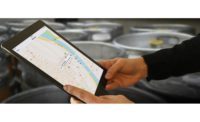Enterprise resource planning (ERP) software is extremely useful for snack and bakery companies, including its ability to track ingredients and other tasks, thereby making companies more efficient. And considering its dynamic role in company operations, ERP software is constantly changing and seeing upgrades.
Key features
ERP software systems provide up-to-the-minute process documentation for accurate analysis, says Matt Brown, CEO, Wherefour, Petaluma, CA. Wherefour, for example, allows users to monitor the actual yield and variance from the expected yield. “Comparing different batches to each other or to a production standard allows companies to fine-tune their processes and eliminate errors that lead to waste. The system provides the data needed to identify problem areas so root causes can be identified and corrected.”
Lean manufacturing. The ERP system provides process documentation that always is up to the minute to yield more-accurate analysis. Comparing different batches to each other or to a production standard allows companies to fine-tune their processes and eliminate errors that lead to waste. The system provides the data needed to identify problem areas so root causes can be identified and corrected.
Continuous process improvement. Having comprehensive production data at your fingertips allows opportunities for improvement to be identified, and the results of any changes can quickly be evaluated and adjusted if needed. Individual locations can be set up through the production process, and those can be cycled through manually, if needed, for analysis. Activity reports can show areas of change or, potentially, highlight bottlenecks.
Key production indicators. Yield analysis tools can help spots where waste is generated in the production process. Tools, such as location set-up, provide specific data for analyzing changes made to the process. Work order reports reveal changes in productivity as products move through different areas of the plant. Labor costs associated with each batch of product can be tracked, which can be compared to past batches to provide another productivity indicator.
Cost efficiency. Managing inventory costs is critical for food manufacturers. That can be as simple as eliminating waste by tracking and utilizing ingredients prior to expiration dates. Wherefour has material resource planning and forecasting tools that help with just-in-time purchasing to reduce the cash tied up in inventory. This allows more free cash flow to the business and lessens the risk of a cash crunch. The resource plan will compare current inventory and what has been ordered with upcoming production needs for standing orders and purchase orders to more-accurately forecast future requirements.
Compliance efficiency. Having reports at the push of a button to respond to auditors, inspectors or customers saves time, which translates to labor cost savings. Documentation should be attached to individual work orders from lab results and photos to handwritten notes. These are organized and stored in one cloud-based system, which eases the traceability burden and is really helpful for businesses that must comply with strict regulatory requirements.
Connected systems. Snack and bakery production might feature multiple systems that are not connected, with slow processes. An adaptive ERP system that includes additional functionality such as supply and demand planning, quality, serialization, asset management and global financials, and supplier and customer management is critical, says Stephen Dombroski, director, consumer, food & beverage markets, QAD, Santa Barbara, CA.
Flexible ERP with minimal customizations. The market is evolving quickly and will continue to do so. Therefore, your ERP system, processes and operations should likewise change with the times. This is difficult when your ERP system needs to be customized to fit your environment. An effective ERP is one that can be adapted to meet future needs with no or minimal customizations.
Scalability. After food safety and quality, the top priority should be business growth. Your systems must be in line with your processes and business goals. Your ERP should be designed to keep up with market challenges and your growth goals.
Managing disruptions. There are many disruptors in the snack and bakery industry today. From transportation costs rising, to consumers looking for healthier products in sustainable packaging, disruptors are growing. Moving forward into 2020 and beyond, the companies in this industry who will succeed will be the ones who have agile, adaptive and effective systems and processes in place to combat those disruptions, recommends Dombroski.
Smart solutions
FlexiBake, Vancouver, British Columbia, makes ERP systems that allow users to automate simplified, repetitive tasks that don’t require the thought, emotion and experience humans are able to add to a task, says Nicole Ortner, senior product consultant. “For example, many snack and bakery operations have clients who have set standing orders daily. Rather than keying these orders into a spreadsheet every day, ERP software systems like FlexiBake can automatically generate hundreds of daily orders, instantly—converting them into invoices and even emailing them out when the drivers leave for their deliveries.”
It can also take a lot of time and calculation to figure out supply purchasing, but ERP systems like FlexiBake are able to calculate expected production amounts based on historical information, look at the current inventory, and then automatically generate purchase lists, Ortner explains.
“Production teams could be far more efficient with production reports based on historical values, allowing them to get a jump start on the day prior to order cutoff times with bakery-based ERP systems like FlexiBake,” says Ortner. “In FlexiBake, production teams can also track key performance indicators such as yield by shift, time per item, etc., allowing management to make informed decisions. With inventory tracking and production forecasting, FlexiBake users are able to conduct just-in-time manufacturing processes, saving time and money on storage and wastage costs.”
Automation tools like FlexiBake’s online ordering portal and direct store delivery app for drivers allow manufacturers to run all weekend without requiring weekend administration staff, Ortner notes. It also forces customers to follow required cutoff times, creating a more-organized approach to production planning.
Daniel Erickson, director, product strategy, Open Systems, Shakopee, MN, says that ERP software developed for the snack food and bakery industry improves efficiencies throughout the supply chain with its integrated recipe management, inventory control, and new product development. “Customer loyalty is strengthened when consumers experience consistency in the taste and quality of their snacks and baked goods. Manufacturers can deliver quality, predictable products by utilizing an ERP solution’s recipe management functionality to maintain current recipes in real-time while recording historical information such as revisions and production notes.”
Offering the ability to easily scale the recipe to meet the production batch size is important, Erickson says. “Not only does this feature ensure recipe integrity, for example, tracking ingredient properties and characteristics sourced from various vendors, but it also increases efficiencies by having all production information easily accessible to the manufacturing staff—eliminating manual processes.”
ERP solutions developed for process manufacturers also provide real-time inventory tracking that helps producers maintain appropriate stocking levels in order to reduce waste from spoilage and avoid overproduction, notes Erickson. For cost savings, he notes, it facilitates lean manufacturing practices and first-in, first-out inventory methods. Integrated materials requirement planning functionality streamlines production requirements and assists in making accurate purchasing decisions and efficient planning with readily available work-in-progress information. “Planners, buyers, warehouse managers and schedulers all have visibility into the single database of information that houses sales, accounting, manufacturing, quality and inventory to make data-driven production decisions.”
Quick to market
Being able to bring a new product to market faster and cheaper than the competition is an important goal of many snack and bakery businesses, says John Garcia, director, BatchMaster Software, Inc., Irvine, CA. “Being able to accelerate the product development process is the first step to this end. Leading food manufacturing applications develop and maintain separate recipe and packaging specifications, enabling food developers and packaging designers to manage their own specifications, respectively.” Linking recipes to packaging specifications creates the finished goods specifications, thus linking one change to one specification to all related specifications, he explains.
“By taking into consideration inventory valuation methods, static and dynamic labor costs, and consumable costs, plus possible by-product and co-product costs, private label and contract food manufacturers can quickly provide accurate customer quotes,” says Garcia. “Costs, QC tests and facility parameters should be built into the specifications to allow finance, quality and plant managers to review and approve submitted specifications from their departmental perspective via multi-level workflow processes.”
Regulations in regard to food safety and quality continue to evolve globally, and the need for traceability and overall quality transparency is required more for manufacturers today than ever before, notes Dombrowski.
“Utilizing an ERP solution’s robust R&D functionality provides a sandbox environment for bakers and chefs to develop and experiment with new recipes without affecting live production. With fluctuating raw ingredient price points, the solution easily calculates profit margin ratios with its access to current ingredient costs and recipe revisions. With the capability to easily convert R&D items into live production,” says Erickson. “Manufacturers can streamline new products and quickly introduce them to store shelves and bakery counters,” he remarks.
“Manufacturers will need to implement flexible processes and systems to allow for the quick adaption to disruptions and the changing marketplace,” says Dombroski. “The rapid, agile and effective manufacturer will be the ones that combine advanced digital technologies and proven industry best practices to stay ahead of the competition.”





